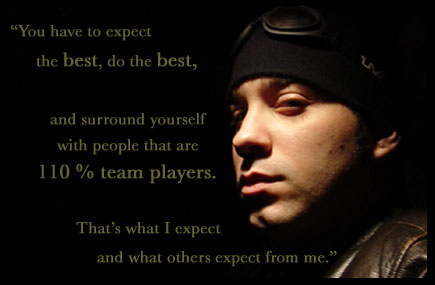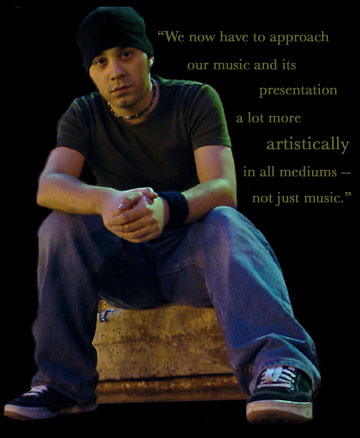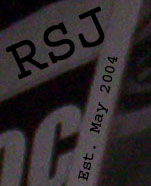|
iSOL8ED. Both the name of Michael Carrasquillo's solo project and a description of the nature of this work. A multi-talented
artist, Carrasquillo spent much of his musical career enhancing the work of other artists; he's participated in everything
from remixing for Chemlab and Die Symphony to editing for R. Kelly to drumming for Slick Idiot. But now it's time for Carrasquillo,
himself, to step front and center. Having split from Slick Idiot and on the verge of releasing his own "Scene Full of
Invisibles," he discusses taking the path of independence and the freedom in being iSOL8ED.
Rock Star Journalism: Music seems to have been part of your life from a very early age. When did you first know that this
was what you wanted to do with your life?
Michael Carrasquillo: My cousins were in a lot of punk bands in the 80s. So, every time I would see them, they would
always bring pictures home and all this other stuff. And I remember many times where they would come home with black eyes
and bruises all over the place from moshing, and my family would be like, "what the hell happened to you?" But I
always thought that was such a cool environment. They were normal guys, but they were going out there really rockin out and
being raw, and I identified with that. The rest of my family would look at them like they were crazy, but for me it was like,
that's what I wanna do.
RSJ: This was when you were living in New York?
MC: Yes.
RSJ: Then you moved to Nashville when you were a little bit older?
MC: Yeah, I moved to Nashville when I was about 12.
RSJ: Since that's such a huge music scene, how do you think being in that area influenced your later career?
MC: I think it gave me a little bit more organization, and it gave me a little more knowledge of how to conduct yourself
because Nashville is a place where there is a lot of structure. They take songwriting with a lot of pride -- in order to
get a good song you have to craft it well. Then they want to make a good show out of it and perform the song with emotion.
That really gave me a lot of root as far as knowing how I wanted to execute my moves and how I wanted to be perceived. It
was a great experience.
RSJ: I read that you moved from Nashville to Baltimore because you thought there would be more opportunities there. I
was curious about this because, being from the Baltimore area, I've never thought of it as a big music town, certainly not
as compared to Nashville.
MC: The reason I came to that conclusion was because Nashville at the time was only country music oriented. Doing anything
outside country music was quite hard. The only opportunities that you had were the immediate people that were around that
you were playing shows with. Eventually everybody ended up joining everybody else's band, it seemed like. And there were
only a handful of really good artists, like maybe five of them. So, I felt like going to Baltimore would be a new experience,
and it still had the small town mentality, but getting toward the big city.
RSJ: Who did you work with in this area?
MC: I managed a band called Popstar that was fronted by a guy that had a band in the 80s called The Wanting Seed that
was doing well in Baltimore. The biggest one was working with Billy Zero from HFS. I managed his band, LMP. I really wanted
to involve myself [with the local music community] as much as I could.
RSJ: Did you enjoy working in the business end of the industry?
MC: It's really a love/hate relationship. I worked for TVT awhile, and I worked with other people long enough that at
one point I started to become exactly what I didn't like about the business. I went in there with the attitude of having
respect for the artist because I'm an artist myself, and I wanted to applaud that and do everything I could to help people
out. But after awhile, I just got really burnt. I think the old saying is once something is not fun anymore you should stop
doing it. I didn't want to get jaded -- I still want to have some hope that there are artists out there doing music that's
well-received and there are labels that support that.
RSJ: Nearly everybody I talk to is having problems with label support, given that there are so few choices.
MC: I really don't know if the industry has grasped the potential of the digital medium; I think there are a vast amount
of innovative ideas that could take the business to another level and give downloaders what they want and CD purists what
they want. But it's not all the record labels' fault. People like to always blame the labels, but I think they're doing
what they can trying to keep up with the demand. And the demand for the fans is just getting the music, period. But there's
an artistic expression that extends from a packaging standpoint beyond the music, and I think that is being misrepresented
and now it's just about downloading the tracks -- who cares about plastic cases and paper, who wants thank you liner notes?
People just judge you from an iTunes download and there's no artistic extension beyond that. I don't know where that got
lost.
RSJ: You seem to be very much a visual arts person; I noticed on your site that you're involved with photography.
MC: Yeah, I do a lot of photography. I'm trying to work on putting together a little book with some of the stuff I've
done. I think when you see a good photograph, it puts you into that moment. Even 50 years down the road, I could look at
that photograph and say I remember that day. And I think even if the person looking at the photograph wasn't there, they
can relate emotionally when they see a picture.
 RSJ: I read that you recently left Slick Idiot, the band you were drumming for on their last tour. What happened to cause
this split?
MC: Well, to be honest it was something that I knew was coming. The "High Life for Low Lives" tour in 2002
was quite a challenge financially, routing, personnel and personality-wise. I was game for doing the tour and excited to
live the reality of sharing the stage with two fantastically talented men, En Esch & Guenter [Schulz], but unfortunately
it wasn't all glamour. When you live in a van with other people, get little to no sleep and have to drive hundreds of miles,
things start to make people crabby; that's touring.
I wish I could say that was the case though. Guenter and I had some issues before we even officially met that just boiled
to a point of no return while on tour. All I can say is, I don't know exactly what it was that Guenter wasn't happy with
me about, but he, to this day, has yet to express himself directly to me. I've tried to speak with him as a professional
many times but never got anywhere with him. In this business, passive aggressive behavior is just not welcome. You have
to expect the best, do the best, and surround yourself with people that are 110% team players -- that's what I expect and
what others expect from me. That means everyone should be on that page. I know there are Slick Idiot fans that have e-mailed
me, talked to me while on tour, taken photos of me, and shit like that, but anything and everything I've done was for the
better of the Slick Idiot team. As the tour continued, I began to establish my own presence and persona within the band,
however, Guenter did not appreciate or support that. He would have preferred that I remain silent and invisible. En Esch,
on the other hand, never seemed to have a problem with my growth; he encouraged it. Esch was always excited about what I could
bring to the table but Guenter felt I was taking his project over.
Two days before the tour started, I had to get our van from Boston and drive it back to NYC. Sounds easy, but that van
was a death trap! I lost control of the steering for three to five seconds at a time about 25 times in the four-hour drive
because the tie-rod with damaged. It was to the point where I drove it 35 miles per hour on I-95 because I came 1.5 seconds
from a major accident. I was terrified! Bottom line, that van should not have been driven in that state, period. But it
was either get this van to NYC, no matter what, or no tour. I know that's insane, but that's the level of passion I have,
I guess to the level of lunacy. I also helped Dawn (the tour agent) with venue worries and creating posters for them and
mailing 'em out. I just wanted Slick to be a success. Taking over? No -- that's just pride in what I do!
RSJ: I know your solo album is one of your biggest projects right now -- could you describe the work on "Scene Full
of Invisibles?"
MC: There's so many levels to this record because it was done at different periods of time. Most of the stuff started
after the Slick Idiot tour in 2002, so coming off the tour some of the stuff is still amped up and aggressive. Then, later
on down the road it was a really hard economy and it was hard to get things rolling, so a lot of the stuff on there is somber
and reflective. Then, there's other stuff that was written later that's very commercial-minded. So, I'm really excited cause
I think this record has a roundness to it, that there may be a track for every emotion.
 RSJ: Do you have a release date for this album yet?
MC: To be on the safe side I'm shooting for a Spring 2006 release. It's all wrapping up really well, and I'm excited
for what people are gonna hear. I am also interested in shopping this to record labels. There will be a video shot for one
of the songs before the year ends as well. This has been a long time coming, and I want to get something out there for me.
There are also plans for a few spot shows around the mid-atlantic, possibly this fall or first thing in the new year. I
hope to play Baltimore also, since that's where I spent some interesting time in my career. I have a lot of friends there
and just am looking forward to coming to my second home proud of what I have accomplished.
RSJ: How would you describe this album in a musical sense?
MC: I'm very much still trying to find a style cause there's so many things I like in music. But the one thing that rings
true about this record is the cinematic nature of it. It's very epic. I'm a huge fan of film and the way scores operate.
That's kind of the style that's always there through a lot of the stuff. Especially the Chemlab remix I worked on, that's
another one that I felt like all the way towards the end of the song it just gets bigger. I think that ends up being my style
-- having a big finish.
RSJ: Speaking of Chemlab, you played with them at the Boston show. How was that experience?
MC: That was a cool thing to be involved with. Jared and I have been talking about it since I finished the remix for
Chemlab. It was a one off gig and I just asked to be involved; he was cool with it. I sang "Summer of Hate" and
had a blast doing it. I know Jared wants to do a proper Chemlab tour in the future, and if this is any indication of things
to come, then Chemlab fans are in for a killer show!
RSJ: You mentioned some remix work you've done; I read that you've also done some editing projects, including the R. Kelly
and Ciara DVDs. How did you get connected with those artists? They seem pretty far outside the genres you've usually worked
with.
MC: I needed a job that would supply me a bit more income than I was getting, which in NYC there is never a comfortable
amount of income. My friend's boyfriend put me in touch with Jim Swaffield, music video director of Will Smith, A Tribe Called
Quest, Wyclef Jean, etc. I went to speak with Jim and found that we have similar ideas about music, film and art and its
ability to paint a broader picture for the artist. He's huge into making DVDs seem like they are interactive and have a mind
of their own. I told him about some ideas that I had about what I wanted to do in my own videos, and we spoke about how musicians
are no longer just musicians anymore. We now have to approach our music and its presentation a lot more artistically in all
mediums -- not just music.
With Jim, I also brought to the table a vast knowledge of pretty much everything. To be honest, and I know it's not very
rock star of me, I didn't have the cash to take my machine to get fixed, install parts, wipe a hard drive, etc. I learned
how to service my own computer as well as other things. I've always enjoyed opening shit up and seeing how it works. So
all that time learning on my own is what gave me the heads up for that job. I'm not just a musician, but an editor, surround
mixer, tape operator, computer repair, really anything. That was invaluable for Jim in order to do the schedule that Jive
needed for both R. Kelly and Ciara's projects.
RSJ: Having worked in so many areas of the industry, is there anything else you'd like to explore?
MC: I'd like to give a shot at scoring film or a video game. Sound design is interesting territory that I would like
to explore.
Got something to say about this feature? E-mail us.
|

